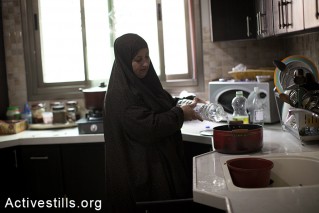
Update: On 2 July 2015, after months of concerted campaigning by ACRI and residents of various neighborhoods in East Jerusalem, the High Court of Justice ruled that the National Security Council should investigate and work to mitigate the water crisis in East Jerusalem, which has been perennially neglected by both municipal and national water authorities.
On Monday, January 19, the High Court of Justice will conduct a follow-up hearing on a legal appeal submitted by the Association for Civil Rights in Israel, together with Palestinian residents of Jerusalem neighborhoods behind the separation barrier, that demands the provision of water services. The hearing took place at 09:00 before Justices Rubenstein, Hendel and Zylbertal, who gave the parties 14 days to meet to begin outlining a plan for upgrading water infrastructure in East Jerusalem, which should be presented to the court within 60 days.
Over the next two months, ACRI held numerous high level meetings with the Israel Water and Sewage Authority and HaGihon (Jerusalem’s water utility), but they were unwilling to compromise on many fronts and as a result the plan they presented to the court was inadequate. In May, ACRI submitted a response to the water authority’s proposal, citing expert opinions from water engineers that averred that the proposal was insufficient. Residents in East Jerusalem currently consume only half of the amount defined by the World Health Organization as satisfying the basic right to water.
Despite the severe water problems in four Jerusalem neighborhoods beyond the separation barrier, the Water Authority and the Ministry of Infrastructure announced to the court this week that they do not intend to connect the houses in these neighborhoods to the water supply, but will rather increase the flow to the central pipelines. According to estimates provided by the Water Authority and the Ministry of Infrastructure themselves, the planned expansion of the central pipelines will not suffice to meet the needs of the residents. Consequently, tens of thousands of residents will continue to imperil their health and limit their consumption of water by making use of electric pumps and industrial containers.
Israeli planning authorities have never conducted urban planning for the neighborhoods of Ras Khamis, Ras Shahada, Dahyat a-Salam, and the Shu’afat Refugee Camp, located in North-East Jerusalem and within the city’s municipal boundaries for 48 years. In the absence of municipal plans, residents cannot obtain building permits – a necessary step in connecting properties to the water system. As a result, almost all of the residences in the area are connected to unofficial pipes that connect to rooftop and street-side water tanks and are powered by electric pumps. This set up involves high electricity costs and poses serious health and safety risks. Jerusalem’s Hagihon water company, in its official response to the court, stated that the existing infrastructure is sufficient for a population of 15,000 people, yet it currently serves approximately 80,000 residents.
The prolonged water crisis is just one example of the chaos and neglect suffered by Jerusalem residents living beyond the separation barrier. Following the construction of the barrier a decade ago, Israeli authorities have reduced or completely stopped providing legally mandated services, and the entire region has turned into a no-man’s land. During this time, the neighborhood infrastructure, weak to begin with, has simply collapsed.
Jamil Sanduka, Chairman of the Ras Khamis Neighborhood Committee: “Since the construction of the wall and the collapse of local infrastructure, the authorities have attempted time and time again to impose upon us the responsibility to provide residents with basic services in an area that forms part of Jerusalem and whose residents are Jerusalemites. We have already begun repairing the roads and building schools at our own expense, since we’ve despaired of receiving support from the municipality. But we have no way of providing ourselves with water. What do they expect of us? That we haul buckets of water on donkeys?”
ACRI Attorney Anne Suciu: “Tens of thousands of Jerusalem residents in neighborhoods beyond the separation barrier live in conditions of criminal neglect and are forced to contend with impossible bureaucratic and planning hurdles. It is the responsibility of the Israeli authorities to conduct proper city planning and ensure the connection of homes to the water supply – a task at which they have failed emphatically. They bear an obligation to now find a solution that will provide these residents with access to clean, running water. Attempts to place the blame at the feet of the residents are without any foundation.”
Additional Materials
Background information on the legal proceedings.
Excerpts from the original legal appeal (in English).







